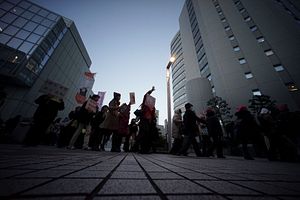Distrust against Japan’s criminal justice system has intensified after a Nagoya district court ruled a father was innocent — despite acknowledging the defendant raped his daughter more than once. Prosecutors aimed for a 10-year sentence but hopes were dashed when the defense took advantage of a legal contradiction of “semi-forced” rape.
In most developed countries, nonconsensual sex is classified a criminal offense. However under Japanese law, rape is only illegal if prosecutors can prove the victim physically resisted the attack, which has to then be recognized by the assailant. In other words, if sexual abuse occurs it would only be subject to criminal punishment if the offender’s violence or intimidation prevented the victim from putting up resistance. Rapists cannot be convicted of nonconsensual sex, and forced sexual intercourse is determined to have occurred only if it was “extremely difficult” for the victim to resist.
The incestuous attacks involved in this case took place in 2017 in both August and September, when the victim was 19 years old. The victim was raped at her father’s place of work and a hotel in Aichi prefecture in the center of Japan’s main island.
A Nagoya district court set out to determine whether the victim was in a state of mind to resist. The prosecutors argued that the victim had continually suffered sexual abuse at the hands of her father since junior high school and wasn’t in a position, mentally, to resist. A psychiatrist who administered a psychological assessment of the victim testified that the daughter was in an oppressed mental position as a result of the continued sexual abuse.
As the victim progressed to vocational college after high school, despite the opposition of her parents, prosecutors say she felt powerless to fight the attacks as her father had reluctantly offered to pay her tuition fees. She stated that since the abuse first began she felt a sense of indebtedness to her father. Prosecutors emphasized the sexual intercourse was coerced and unwillling as the victim was deprived of the willingness and motivation to resist.
However, the Nagoya district court ruled that it was hard to say the victim was in an environment where strong control was exercised and there wasn’t any evidence of a subordinate relationship between the father and daughter. While the judge rejected the defendant’s claims that the sexual intercourse was consensual and condemned it as “utterly unacceptable,” he ruled that the rape was not forced or unwilling. At best the victim’s situation was ruled as “semi-forced” rape, which is commonly applied to cases when the victim is unable to resist due to unconsciousness, drugs, or alcohol.
In reaching that conclusion, the judge drew on the victim’s testimony that in the past she had refused her father and avoided sexual advances with the help of her brother. He rejected the prosecutor’s view the victim was in a compromised or oppressed position and added that while the defendant was guilty he could not find the victim was incapacitated.
The astonishing verdict has sent shockwaves through Japan, igniting a social debate on the disparity between men and women’s legal standing. More than 400 outraged protesters gathered close to Tokyo station to demonstrate against the court ruling and the inadequacy of the law combating sexual violence. Some protesters held flowers and waved placards showing support for the #MeToo Movement while also calling out for human rights and sex education for judges.

































